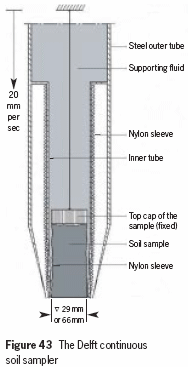Chapter 5
Sampling probes
Delft continuous soil sampler
| DELFT CONTINUOUS SOIL SAMPLER 5.2 | |
 | General principles The Delft continuous sampler, developed by GeoDelft, is used essentially for obtaining high quality samples within very soft cohesive soils. The sampling system is available in two sizes to take continuous samples, 29 or 66mm in diameter. Both the 29mm sampler and the 66mm sampler (Figure 43) are pushed into the ground using standard CPT equipment. Nylon sleeve The sampler is advanced by pushing on the steel outer tubes with the sample being fed automatically into an impervious nylon sleeve. The sample within the sleeve is fed into a thin-walled plastic inner tube filled with a supporting fluid of bentonite. The upper end of the nylon sleeve is fixed to the top cap of the sample which is connected through a tension cable to a fixed point at ground surface. |
| Extension tubes Extension tubes 1 m in length are added as the sampler is advanced into the ground. The 66 mm sampler normally has a maximum penetration of about 18 m, but, in suitable strata with a modified magazine and increased thrust, samples up to 30 m in length have been obtained. The 29 mm sampler is of similar design and requires less thrust. Laboratory tests and visual examination The samples are cut into 1 m lengths and placed in purpose-made cases, being retained in the plastic tubes. The 66 mm samples are suitable for a range of routine index and advanced effective stress laboratory tests. The 29 mm samples are used for visual examination and for determining bulk density and index properties. After the samples have been extruded, they are split in half over their lengths, described and photographed in a semi-dried state when the soil fabric can be identified more readily. | |
